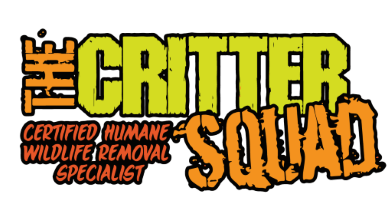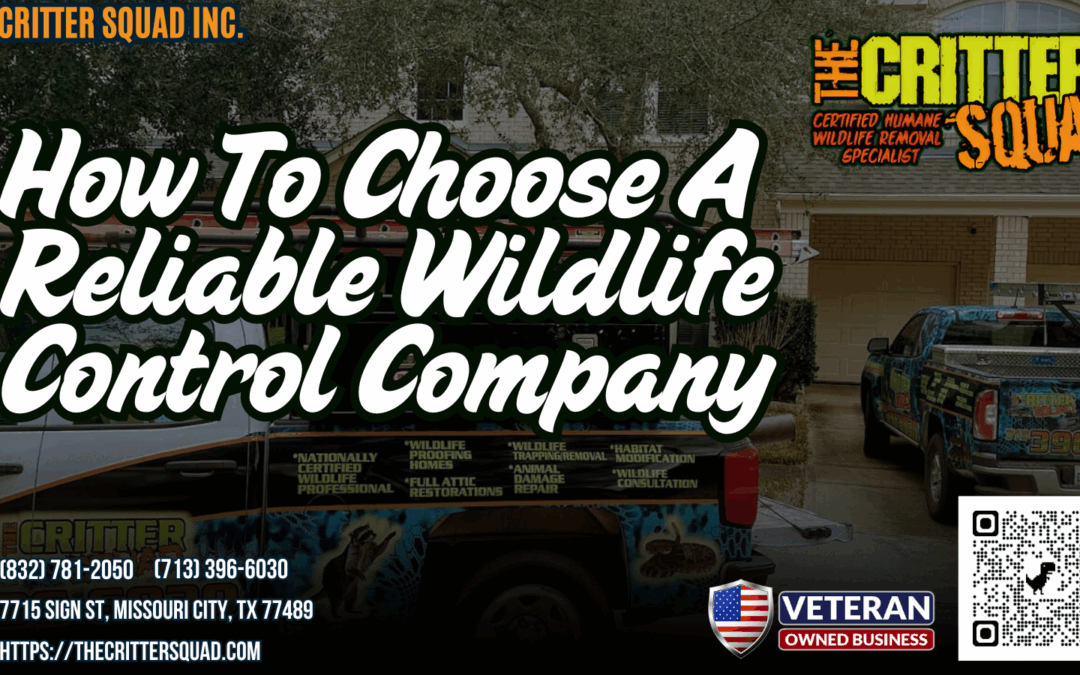Choosing a reliable wildlife control company involves several key steps. First, identify specific wildlife issues and understand effective control methods. Research local companies by checking their licenses, certifications, and customer reviews. Evaluate their experience and expertise with local wildlife species. Assess insurance policies for liability coverage. Compare pricing and services offered, including follow-up care. By considering these factors, individuals can make informed decisions about wildlife control solutions that meet their needs. More detailed insights can enhance this selection process.
Key Article Highlights
- Verify the company’s licenses, certifications, and insurance to ensure legal compliance and protection against potential liability.
- Evaluate the company’s experience and expertise in handling specific wildlife issues relevant to your situation.
- Analyze customer reviews for consistency in service quality, effectiveness, and humane practices.
- Compare pricing and services offered, including follow-up care and prevention strategies for comprehensive solutions.
- Inquire about the company’s commitment to ethical practices and innovative methods for wildlife management.
Understanding Your Wildlife Control Needs
How does one accurately evaluate their wildlife control needs? To begin, individuals should identify the specific wildlife types that are causing issues, such as raccoons, squirrels, or rodents. Understanding the behavior and habits of these animals can provide insight into potential infestations and their impact on property. Furthermore, bats in attic can pose unique challenges for homeowners, necessitating targeted humane solutions for effective removal. Additionally, recognizing the presence of venomous snakes can heighten the urgency of the situation, making it crucial to seek professional snake removal services promptly. Next, it is essential to evaluate the extent of the problem, including signs of damage or health risks posed by wildlife presence. Additionally, individuals should research various control methods, such as exclusion, habitat modification, or humane trapping, to determine the most effective approach for their situation. By thoroughly evaluating these factors, individuals can better articulate their needs when seeking professional assistance, ensuring that the chosen wildlife control company can tailor solutions effectively. Raccoons, for instance, are known to cause significant property damage due to their nesting habits and foraging behavior. Engaging with raccoon trapping experts can provide valuable insights into humane raccoon removal strategies that prioritize both safety and effectiveness.
Researching Local Companies
When researching local wildlife control companies, it is vital to verify their licensing requirements to guarantee compliance with state regulations. Additionally, evaluating the experience level of these companies can provide insights into their expertise and effectiveness in handling specific wildlife issues. These factors play a significant role in selecting a reliable and qualified service provider.
Check Licensing Requirements
Guaranteeing compliance with licensing requirements is a crucial step in selecting a wildlife control company. Prospective clients should verify that the chosen company meets the necessary qualifications set by local licensing authorities. This process can be broken down into three key actions:
- Research Licensing Authorities: Identify the relevant local or state licensing bodies that govern wildlife control operations.
- Review Permit Requirements: Understand the specific permits required for handling and relocating wildlife to guarantee ethical practices are followed.
- Confirm Validity: Check the company’s licenses and permits against the licensing authorities to verify they are current and in good standing.
Evaluate Experience Level
Evaluating the experience level of local wildlife control companies is essential for ensuring effective and safe management of wildlife issues. Companies with a proven track record are better equipped to employ appropriate wildlife techniques and adapt to various situations. Prospective clients should investigate how long a company has been in operation and the extent of their training in pest management. Additionally, it is beneficial to inquire about their familiarity with local wildlife species and the specific challenges they present. Client testimonials and reviews can also provide insight into a company’s effectiveness and reliability. By carefully examining these factors, individuals can select a wildlife control company that is not only experienced but also committed to humane and responsible solutions.
Checking for Licenses and Certifications
How can a homeowner be certain they are hiring a qualified wildlife control company? The answer lies in thorough license verification and adherence to certification standards. Homeowners should take the following steps:
- Check for State Licenses: Verify the company holds the necessary state licenses to operate legally, which indicates compliance with local regulations.
- Review Certifications: Confirm that the technicians are certified by recognized wildlife control organizations, showing they have met industry standards.
- Inquire About Training: Ask about ongoing training programs that the company implements to keep staff updated on best practices and regulations.
Evaluating Experience and Expertise
After confirming that a wildlife control company possesses the appropriate licenses and certifications, the next step involves evaluating their experience and expertise in the field. A company’s wildlife expertise is critical, as it reflects their familiarity with various species and the effective methods for humane control. Prospective clients should inquire about the number of years the company has been in operation and the specific types of wildlife they have dealt with. In addition, understanding how the company adheres to industry standards can provide insight into their professionalism and commitment to ethical practices. A knowledgeable team equipped with the right experience can guarantee effective and safe wildlife management, ultimately leading to better outcomes for both clients and the animals involved.
Reading Customer Reviews and Testimonials
When selecting a wildlife control company, reading customer reviews and testimonials serves as a critical component in evaluating trustworthiness. Analyzing common themes in feedback can provide insight into the company’s reliability and service quality. Additionally, understanding various rating platforms helps potential clients gauge overall satisfaction and make informed decisions.
Importance of Trustworthiness
Trustworthiness stands as a crucial criterion when selecting a wildlife control company, as it directly influences both the effectiveness of the service and the safety of the environment. Establishing trust through reputation management is essential for ensuring a company’s reliability. Customer reviews and testimonials serve as critical indicators in this process.
Key aspects to take into account include:
- Consistency of Service: Reliable companies often receive positive feedback for their consistent and effective wildlife control solutions.
- Transparency: Trustworthy firms provide clear information about their methods, pricing, and policies.
- Customer Support: A reputation for responsive and caring customer service fosters trust establishment, assuring clients that their concerns are prioritized.
Analyzing Common Themes
Reading customer reviews and testimonials provides valuable insights into the experiences of previous clients with wildlife control companies. Analyzing these reviews can reveal common themes regarding the effectiveness of services rendered. Clients often comment on the company’s understanding of wildlife behavior, which is essential for addressing issues appropriately. Positive testimonials frequently highlight the use of humane methods, reflecting a commitment to ethical treatment of animals. Clients appreciate companies that prioritize safety and environmental considerations while resolving wildlife issues. Conversely, negative reviews may indicate a lack of professionalism or ineffective solutions. By examining these patterns, potential clients can make informed decisions, ensuring they select a wildlife control company that aligns with their values and needs.
Rating Platforms Overview
How do potential clients navigate the myriad of rating platforms available for wildlife control companies? Understanding these rating systems is essential for informed decision-making. Clients should consider the following aspects when reading user feedback:
- Reputation: Look for overall ratings and the number of reviews, as a high rating with many reviews suggests reliability.
- Specific Feedback: Pay attention to detailed testimonials that highlight the effectiveness of services, customer service quality, and responsiveness.
- Response to Criticism: Evaluate how companies handle negative reviews, as constructive engagement can indicate a commitment to improvement.
Utilizing these criteria can help clients select a wildlife control company that aligns with their needs, ensuring a service that is both effective and customer-focused.
Inquiring About Methods and Practices
When evaluating a wildlife control company, potential clients should prioritize inquiries about the strategies and techniques employed to manage local wildlife populations. Understanding the specific trapping techniques used is essential, as it reflects the company’s commitment to effective and responsible wildlife management. In particular, clients should seek assurances that humane methods are prioritized, minimizing distress to animals while ensuring safety for humans and property. Companies that employ innovative practices, such as exclusion and habitat modification, can further demonstrate their dedication to long-term solutions rather than short-term fixes. Engaging in discussions about these methods can help potential clients identify companies that align with their values and ethical standards, fostering a collaborative approach to wildlife control that respects both nature and community welfare. Additionally, understanding how bats get inside homes can inform clients about the importance of preventative measures in wildlife control strategies. Effective companies often provide humane squirrel removal solutions, ensuring that squirrel infestations are addressed responsibly and effectively.
Assessing Insurance and Liability Coverage
What factors should potential clients consider regarding insurance and liability coverage when selecting a wildlife control company? Understanding these aspects is essential for guaranteeing safe and responsible service. Clients should evaluate the following:
- Insurance Policies: Verify that the company holds extensive insurance policies that cover both property damage and worker injuries during wildlife control operations.
- Liability Coverage: Confirm the company has adequate liability coverage to protect against potential claims arising from accidents or damages incurred while on the client’s property.
- Documentation: Request proof of insurance and review the policy limits to confirm that they are sufficient for the specific services provided.
Comparing Pricing and Services Offered
Determining the best value in wildlife control services often requires a careful comparison of pricing and the specific services offered by different companies. Evaluating pricing strategies alongside service comparisons can illuminate which options provide the most thorough care for wildlife issues.
| Company Name | Services Offered |
|---|---|
| Company A | Inspection, Trapping, Exclusion |
| Company B | Inspection, Trapping, Exclusion, Cleanup |
| Company C | Trapping, Exclusion |
Importance of Follow-Up Services
In the domain of wildlife control, the significance of follow-up services cannot be overstated. These services guarantee the effectiveness of the initial intervention and promote long-term solutions. Engaging a reliable wildlife control company that provides extensive follow-up is essential for several reasons:
- Follow Up Inspections: Regular assessments help identify any new wildlife activity, guaranteeing prompt action if needed.
- Ongoing Maintenance: Continuous monitoring and maintenance can prevent re-infestation, safeguarding both property and peace of mind.
- Client Education: Through follow-up services, companies can educate clients on best practices for wildlife prevention, fostering a more informed and proactive approach.
Incorporating follow-up services into wildlife control practices demonstrates a commitment to thorough care and client satisfaction.
Frequently Asked Questions
What Types of Wildlife Do You Specialize in Controlling?
The company specializes in various wildlife control services, particularly squirrel control and raccoon removal. Their trained professionals effectively address infestations, ensuring humane treatment and safe removal, contributing to community well-being and environmental balance.
How Quickly Can You Respond to My Wildlife Issue?
In times of urgency, response time becomes paramount. Many wildlife control companies offer emergency services, ensuring swift action to address pressing issues efficiently. Timely intervention can greatly mitigate potential damage and restore peace of mind for affected individuals.
Do You Offer Any Guarantees for Your Services?
The company provides various warranty options to guarantee service satisfaction. This commitment reflects their dedication to quality, offering clients peace of mind regarding the effectiveness of their wildlife control solutions and long-term support for any recurring issues.
Can You Provide Referrals From Past Clients?
Research indicates that 85% of potential clients value client testimonials when selecting service providers. Reliable wildlife control companies often provide service reviews to showcase their effectiveness and customer satisfaction, enhancing trust and decision-making for prospective clients.
What Should I Do While Waiting for Your Service?
While waiting for service, individuals should implement safety precautions, such as securing food sources and blocking entry points. Temporary solutions, like using repellents or noise deterrents, can help manage the situation until professionals arrive.




























